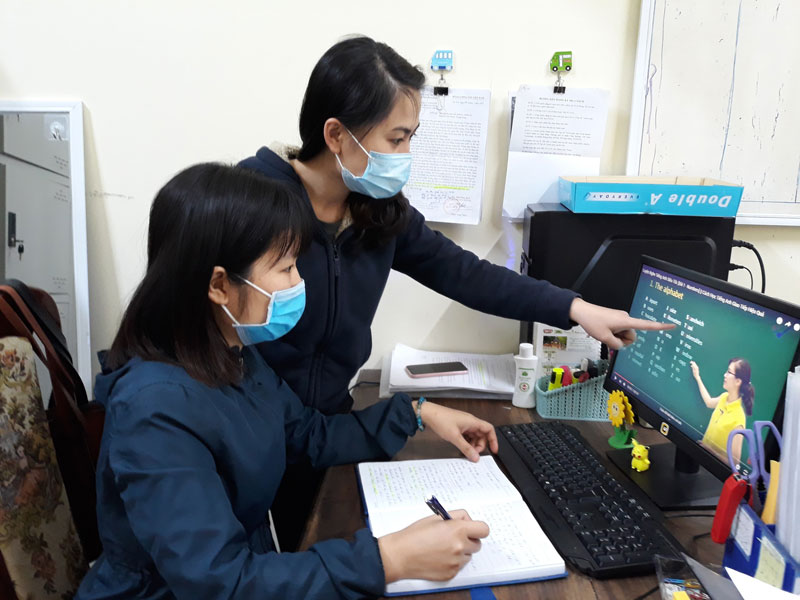
(HBO) – One of the biggest limitations of local public employees is the lack of foreign language proficiency. In the context of global integration, foreign language proficiency has received greater attention from Hoa Binh authorities.
 Public employees in
Lac Son district actively learn English online.
Public employees in
Lac Son district actively learn English online.
With the aim of strengthening training and improving
foreign language proficiency for public employees, the provincial People’s
Committee on January 3, 2020 issued Plan 02 on implementing a national
programme on learning foreign languages during 2019-2030. One of the important
goals of this project is building a professional and high-quality contingent of
public employees who can use foreign languages proficiently at work and work in
international environment.
The
province aims to have 25 percent of local public employees at provincial and
district levels, especially those who hold managerial posts and are under 40
years old, to gain foreign language proficiency at level 4, while 60 percent
and 50 percent of officials holding leadership and management positions
respectively will achieve language proficiency at this level or higher.
The
development of international cooperation and building of a favourable
environment for foreign language learning for public employees have been
carried out in the province over the past time. The locality has stepped up
cooperation with organizations, agencies and units at home and abroad to organize
language training courses, as well as linking with foreign training facilities
and sending employees to courses abroad to improve their professional capacity,
foreign language skills, and working style in international environment./.
Hoa Binh province is undergoing a dynamic transformation amid Vietnam’s national digital transition. Building on Poliburo’s Resolution No. 57-NQ/TW on breakthroughs in science, technology, innovation, and national digital transformation, the province has rolled out a wide range of practical action plans. A standout initiative is the "Digital Literacy for All” movement, an effort to ensure that no one is left behind in the digital era.
Hoa Binh province is undergoing a dynamic transformation in the wake of the national digital transformation movement. Building on Resolution No. 57-NQ/TW of the Politburo on breakthroughs in science, technology, innovation, and national digital transformation, the province has implemented a wide range of practical action plans. A standout initiative is the "Digital Literacy for All” movement ambitious effort to ensure that no one is left behind in the digital age.
With a spirit of unity and proactive problem-solving, the Party Committee, the government and the people of Dong Lai Commune (Tan Lac District) have made great strides in implementing the resolutions of the 24th Party Congress of the commune for the 2020 - 2025 term. Focusing on leadership and practical actions, the commune has brought the Party’s resolutions into daily life, creating strong impacts and pushing the local development forward.
Amid the nationwide push for digital transformation, young people in Hoa Binh Province are stepping up as dynamic pioneers, applying technology to enhance Youth Union operations and expand the reach of youth-led initiatives. Through creativity and adaptability, Youth Union organizations at all levels have introduced a series of practical solutions, contributing to modern governance and community development.
In recent years, An Nghia commune, located in Lac Son district, has stepped up administrative reform, focusing on improving the quality and efficiency of its single-window service unit for receiving and processing administrative procedures. These improvements have helped create favourable conditions for local residents and organisations to handle administrative procedures, contributing to the commune’s broader socio-economic development.
The Prime Minister-approved master plan to develop the multi-use value of forests ecosystems through 2030, with a vision to 2050, aims to improve the management and sustainable use of forest resources, create jobs, increase incomes, and improve the living standards of ethnic minorities, people in mountainous and remote areas, forest workers and those living near forests.



 Public employees in
Lac Son district actively learn English online.
Public employees in
Lac Son district actively learn English online.